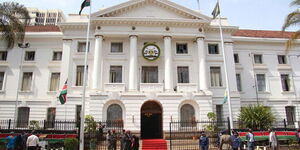Israel, through its envoy to Kenya, on Saturday, expressed displeasure over the collapsed Galana Kulalu Irrigation Scheme.
Israeli Ambassador to Kenya Noah Gal Gendler termed it as the first project funded by the Government of Israel to fail in its 70 years of existence.
He blamed cartels of conspiring to bring down the irrigation scheme despite having consumed billions.
Although the project was expected to produce 20 million bags of maize, an Auditor General's report indicated that only 103,000 bags have been produced since the commissioning of Galana-Kulalu irrigation scheme.
"Galana Kulalu project was destroyed by cartels made up of maize millers. They were the reason the project was deferred from the beginning," Gendler noted.
This has dampened the spirit of the business sector in Israel. It is very sad for the country. We have not given up but this is sending very bad signals," he added.
Gendler explained that the projects' only lifeline was to involve Tana River and Kilifi County Governments to inject more money to revive it.
More than 200 Kenyans who had been flown to Israel for training on the latest farming technology, are now jobless as they were expected to use the skills to run the now failed irrigation scheme.
Vision 2030 Youth Entrepreneur Association Chairman, Edward Githaiga, accused the government of abandoning them despite being sent to Israel to acquire skills.
“This flagship project that was undertaken by the government with support from Israel was meant to boost food security in the country. But some ruthless cartels keen to sustain their business in maize milling and importation are working to shoot down the project,” Githaiga regretted.
In 2016, President Uhuru Kenyatta had stated that the knowledge earned by the students would be used to revolutionise agriculture in Kenya starting with the Galana-Kulalu Irrigation Scheme where the students would first apply their skills.
“A desert can truly be a paradise if we are committed. This place is drier than any part of Kenya but look at what they produce,” noted Uhuru during a tour of farms in Israel.












